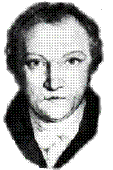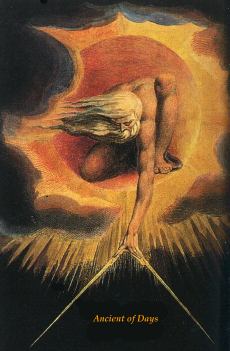
To see a World as a Grain of sand
And a Heaven in a Wild Flower,
Hold Infinity in the palm of your hand
And Eternity in an hour.
..Auguries of Innocence
Two passages characterize Blake's remarkable system of insight, thought and belief:

To see a World as a Grain of sand
And a Heaven in a
Wild Flower,
Hold Infinity in the palm of your hand
And Eternity
in an hour.
..Auguries of Innocence
I feel that a Man may be happy In This World. And I know that This World
Is a World of Imagination & Vision. I see
Everything I paint In This World, But Every Body does not see alike. To
the Eyes of a Miser a Guinea is more beautiful than the Sun, & a bag
worn with the use of Money has more beautiful proportions than a Vine
filled with Grapes. The tree which moves some to tears of joy is in the
eyes of others only a green thing that stands in the way. Some See
Nature all Ridicule & Deformity. & by these I shall not regulate my
proportions; and some Scarce see Nature at all, But to the Eyes of a Man
of Imagination, Nature is Imagination itself. As a man is, So he sees.
As the Eye is Formed, Such are his Powers. You certainly mistake when
you say that the Visions of Fancy are not found in This World. To me is
all One Continued Vision of Fancy or Imagination ....to Dr. Trusler,
Aug 23, 1799
A word of explanation:
The word "Imagination", as Blake uses it, is not connected to the word "Imaginary", it is more closely connected to the word "creativity" and has a context of reality.
 Blake's most popular poems have always been Songs of Innocence, written in 1789. These
lyrics are remarkable for their perception and their eloquence. In 1794
Blake published Songs of
Experience, using the same style and much of the same subject
matter, but from an entirely different perspective, as in Songs of
Innocence. Both series of poems take on deeper meaning when read in
conjunction. Innocence and Experience are contrasted in such companion
pieces as The Lamb and The Tyger.
Blake's most popular poems have always been Songs of Innocence, written in 1789. These
lyrics are remarkable for their perception and their eloquence. In 1794
Blake published Songs of
Experience, using the same style and much of the same subject
matter, but from an entirely different perspective, as in Songs of
Innocence. Both series of poems take on deeper meaning when read in
conjunction. Innocence and Experience are contrasted in such companion
pieces as The Lamb and The Tyger.
Using his skills as an
engraver and watercolorist, he illuminated his poems with designs. There
is a unique quality about Blake: The poems and the illustrations are so
inextricably intertwined that separation of the text from the plate
strips much of the power from his work.
I give you the end of a golden string,
Only wind it into a ball,
It will lead you in at Heaven's gate
Built in Jerusalem's wall.
........Jerusalem
America, A Prophecy Plate 11
Fiery the Angels rose, & as they rose deep
thunder roll'd
Around their shores; indignant burning with the fires of Orc
And Bostons Angel cried aloud as they flew thro' the dark night.
He cried: Why trembles honesty and
like a murderer,
Why seeks he refuge from the frowns of his immortal station,
Must the generous tremble & leave his joy, to the idle: to the pestilence!
That mock him? who commanded this, what God? what Angel!
To keep the gen'rous from experience till the ungenerous
Are unrestraind performers of the energies of nature;
Till pity is become a trade, and generosity a science,
That men get rich by, & the sandy desart is giv'n to the strong
What God is he, writes laws of peace, & clothes him in a tempest
What pitying Angel lusts for tears, and fans himself with sighs
What crawling villain preaches abstinence & wraps himself
In fat of lambs? no more I follow, no more obedience pay,